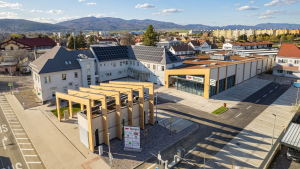
Colliers International launched a SEE and Baltics Infographic Pack to track the ever-changing situation across these countries and property markets.
The Infographic Pack is the continuation of Colliers International’ Special Insight Series - Opportunities and Challenges in Extraordinary Times. The aim of the Infographic Pack is to provide clients, partners and media with regularly updated data and market sentiment. The document contains, among others, the present data for stock, supply, rents, yields, and demand for all property sectors in a number of markets across the SEE and Baltics. In total there are 11 markets discussed.
Apart from these factual data and market parameters Colliers also presents information related to the measures on people and business, support of local governments, trends and outlook for the SEE and Baltics real estate sectors during these unprecedented times.
“The Baltic region is aligned with the CEE region in terms of COVID-19 impact and measures taken by governments to resist the economic impact. Retail (except for food & beverage, pharmacy) and hospitality industries (hotels, restaurants) have been hit most greatly so far, similarly to other CEE countries. Governments of each of the Baltic countries have implemented measures to limit or diminish the impact of restrictions taken due to the spread of COVID-19,” Deniss Kairans, Managing Partner for the Baltic region at Colliers International comments.
“Similarly to the Baltics and other CEE countries, the Croatian and Slovenian governments have prepared anti-coronavirus packages to support the economy and citizens. As it comes to the real estate sector we expect that the majority of new deals will be on hold until there is more clarity,” Adds Klara Matić, Head of Investment, Valuation and Advisory Services adds.
The key messages include:
- SEE and Baltics countries were some of the first to implement restrictive measures on people and business and have therefore seen relatively low case numbers to date. Hopefully, this remains to be the case but, the lack of tests in many markets may make these numbers misleading.
- Regional governments have been under immense pressure to announce and deploy measures to aid and support people, business and economies. These are now beginning to materialize and will adapt over time but, they will also take time to deliver at this scale.
- SEE and Baltic economies are under unprecedented pressure after many years of solid growth. Although the severity will be determined by the length of the pandemic and subsequent recovery, all economies are expected to see a decline or fall into a recession in 2020.
- Regional office markets were coming off the back of a strong growth period. It will be essential for landlords, tenants and all involved to find ways of working through the situation. The majority of employees work remotely, while construction delays are anticipated.
- Some investors are looking forward to benefit from decreased competition and possible new opportunities.
- E-commerce platforms, particularly food, are thriving and adapting to a huge spike in demand.
- Logistics are going ballistic as e-commerce operators and distributors adapt to keep supply chains running smoothly as demand spikes from people and business operating under very different circumstances. Additional, short term storage/processing solutions are therefore in higher demand.



